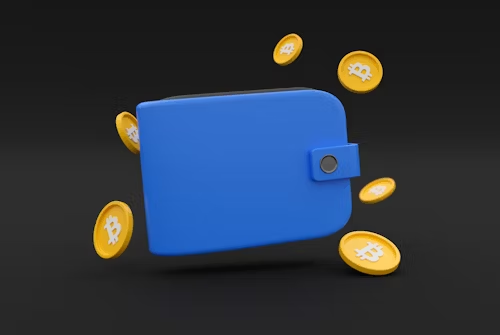So, first off, what is a crypto wallet, and why would you choose? This article tells you what a crypto wallet is, what types of wallets are there, and some really important things to remember before you choose to use one.
What is a Crypto Wallet?
A crypto wallet is any equipment that is necessary for you to store and utilize valuable cryptocurrencies such as Bitcoin, Ethereum, or any other tokens. In simpler terms, it is just like an online bank account-only there is no dollar or euro there, just your digital assets.
How do Crypto Wallets Work?
It doesn’t physically store the digital asset but the private key. The key helps in accessing the currency and subsequently allowing the holder to regulate it.
- Public Key: Here the public key is the equivalent of your bank account number which you give to someone to receive funds.
- Private Key: Here the private key is no different from your passcode or password. You must never disclose it so that you can deny others access to your funds.
Types of Crypto Wallets
Two main varieties of crypto wallets, which are hot wallets and cold wallets, cater to your needs with pros and cons backing each.
Hot Wallets
Hot wallets requiring network connectivity and the ones that are commonly used for daily transactions.
- Examples: Mobile apps, desktop wallets, web wallets.
- Advantages: Convenient and readily available.
- Disadvantages: Security breaches are more prevalent by the nature of the wallet itself since everything is online.
Cold Wallets
Offline wallets are known as cold wallets which offer better security for long-term storage.
Examples include hardware wallets and paper wallets.
- Advantages: Highly secure as they are never connected to the internet.
- Disadvantages: Cold wallets are less convenient for daily usage and could be lost if not kept properly.
Tips on How to Use a Crypto Wallet
Here is a quick checklist of essential aspects to keep in mind.
- Have a Clear Picture of Your Wallet Needs
Are you a frequent trader or a holder? Are you up for big gains, or do you like to gamble? Trading and big gains run through hot wallets; cold wallets are for the more serious members of the community.
- Look Out after Certain Parameters for the Gateway
Seeing the wallet characteristics is the major deciding factor in your mind. These include:
- Two-Factor Authentication (2FA): A good wallet will encourage the use of 2FA to provide even more protection.
- Backup Options: Always ensure there is backup to the wallet to regain access to your funds after technical failures or glitches.
- Reputation: Read why the wallet received so many reviews online; consider looking into any past security breaches.
- Private Key Management
This is the big one-“not your keys, not your crypto”-underscored on notes around the industry, reminding you of the dangers of losing control of your funds by losing control of your private keys. All else being equal, always go with a wallet that gives you exclusive access to your private key.
- Compatibility Consideration
Not all wallets will hold all the tokens. Confirm that the wallet you select supports what you need.
- Be Obscenely Vigilant about Phishing
Numerous phishing scams aimed at cryptocurrency users involve fake wallet sites or phishing emails. Always look twice at the URL before you get phased into clicking a link.
- Back-up Your Wallet
If your wallet offers back-ups, make sure you keep them safe. For hardware wallets, make a note of your recovery seed phrase (a series of words acting as a back-up) and keep it secured.
- Hidden Fees Need Eyes On Them
Some wallets charge fees for transactions or have hidden costs. Ensure clarity of the wallet’s choice to keep every transaction in the correct perspective.
- Keep Your Computer Software Updated
If using a hot wallet, keep the wallet updated with the most recent version of the software to prevent security risks.
Understanding Cold Wallets
For those who place security first, a cold wallet is a necessity. Icons such as Ledger and Trezor are popular due to their philosophy of keeping your private keys offline, hence killing the risk of hacking. However, they are challenging to use and maintain if you do not mind that you may lose your keys with a little off-handed care.
Best Practices for a Safe Crypto Wallet Usage
- Use Multiple Wallets: Keep in mind to divide your cryptocurrencies among multiple wallets for different purposes.
- Double Check All Transactions: Always check the receiving address twice, as crypto transactions can’t be reversed.
- Avoid Public Wi-Fi: Don’t carry out any wallet activity on public Wi-Fi networks or unprotected Wi-Fi networks as they are prone to attacks.
Conclusion
A crypto wallet is the portal through which the management of digital assets is done, but as well, the same wallet bears huge responsibility. Whichever wallet you pick-hot wallet for convenience or cold wallet for security-always make certain to safeguard your assets with everything you can. With the above tips in hand, you should now feel more comfortable and secure in the digital realm of blockchain.
Discover more safety tips for using crypto wallets here.
Want to learn more about cryptocurrency? Visit


